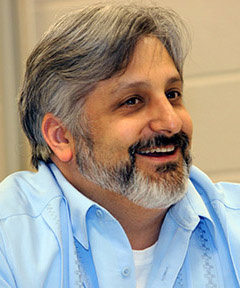When Gabriela Rivera’s aunt was diagnosed with breast cancer a decade ago, few of her family members knew many details about it. “She couldn’t really explain to us what was going on,” says Rivera, whose family emigrated from Mexico to Iowa in 1988. “It seemed very secret.”
Rivera, a program specialist with the University of Iowa Center for Diversity and Enrichment, says her aunt returned to Mexico to be cared for by her children. By that point, the cancer had progressed to an advanced stage.
“Even though she tried alternative opinions and care there, she eventually passed away,” says Rivera.
Although every patient’s situation is unique, Rivera’s aunt reflects several patterns researchers see in the Hispanic/Latino experience of cancer, including later diagnosis, later treatment, and, with some cancers, higher mortality rates compared to the U.S. population as a whole.
A number of barriers—economic, language, lack of insurance—can present obstacles to health care for Latinos. In turn, many health providers may not be familiar with Latino cultural values and beliefs, creating another gap between patient and provider.
These topics will form the focus of the Latino Cancer Summit, a one-day workshop to be held Friday, May 24 on the UI campus. Organized by researchers in the UI College of Public Health with grant support from the Iowa Cancer Consortium, the by-invitation-only summit will bring together health educators, community members, public health professionals, health providers, and community advocates with an interest in cancer prevention and screening for Latino communities.
As a lead up to the summit, a team led by Jason Daniel-Ulloa spent several months interviewing key individuals within communities in seven Iowa counties (Wapello, Scott, Polk, Muscatine, Marshall, Linn, and Johnson) to learn more about cancer services, prevention efforts, barriers to care, and identification of strategies to address barriers within the Latino community.

“The data we’ve gathered will be presented in a report at the meeting,” says Daniel-Ulloa, a post-doctoral research scholar with the UI Prevention Research Center for Rural Health.
Participants will then develop action steps to address gaps in knowledge related to cancer prevention, screening, and treatment.
“The goal is to develop a resource guide and a network of people interested in working with the Latino community to prevent and treat cancer,” says Daniel-Ulloa, who adds that the summit is a "building block in a larger Latino health research agenda.”
He also points out that it’s important to take into account how varied the state’s Latino population is.
"The Latino experience in Iowa is much more diverse than people think,” he says. “Some communities go back generations, while others have grown very rapidly recently.”
Families such as Rivera’s also tend to have different generational perspectives on health care.
“My mother and aunts came to the U.S. at a late age,” says Rivera, who was a teenager when she moved to Iowa. “They don’t trust the U.S. health system very much. They’re used to how it was done in Mexico, so they’re always comparing. They’re very good about going to the doctor, but they’re skeptical about the results or care they get here.”
Despite these reservations, Rivera says several of her older relatives have undergone successful treatment for ovarian, prostate, and skin cancer. She sees increasing awareness of cancer prevention as a key to improving outcomes.
“I’m excited about the summit and educating people about things we can do to help prevent cancer,” she says. “It’s very important to address it and not wait until you find out you have it.”
Note to Media
The Latino Cancer Summit will take place from 9 a.m. to 4 p.m. on Friday, May 24, in Room C217 of the College of Public Health Building (CPHB), 105 River St., Iowa City. Researcher Jason Daniel-Ulloa will be available for interviews the day of summit from 8:30-8:45 a.m. in room C217 CPHB.